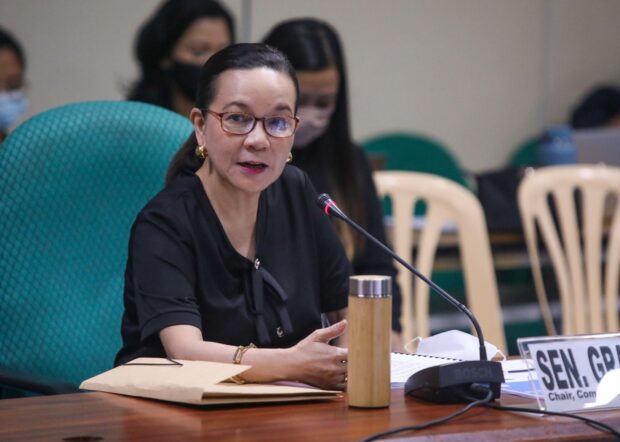
Sen. Grace Poe (File photo from the Senate Public Relations and Information Bureau)
MANILA, Philippines — Sen. Grace Poe said on Wednesday that the water interruptions affecting nearly 600,000 residents in Metro Manila only showed the need to create a new department to harmonize the mandates of over 30 state agencies involved in water supply systems.
Poe, the chair of the Senate Committee on Public Services, also blasted the Metropolitan Waterworks and Sewerage System (MWSS) for failing to build infrastructures to address the water supply problem in Metro Manila.
She said establishing the Department of Water Resources would centralize government efforts in distributing and managing water and regulating water utilities.
“I’m sorry to say this, but the MWSS has become inutile,” Poe said at the Kapihan sa Senado press forum.
“They have failed in the administration of [water resources]. We will really have a problem in the supply of water because we don’t develop the needed infrastructure,” she said.
She noted that the MWSS was only good at disrupting people’s water supply, but not at attending to needed investment in infrastructure.
The senator said her committee will conduct an inquiry to review the compliance of water concessionaires with their contractual obligations under their legislative franchises.
“About 11 million [Filipinos] still do not have access to [clean] water. That’s almost 10 percent of our population. There’s really a failure in the implementation [of policies],” she said.
Sen. Christopher Lawrence Go also urged the MWSS to be more responsive to consumer needs after water services were privatized in 1997, or 26 years ago.
“They have to make a way,” Go told reporters in Filipino in Quezon City. “People pay properly to get water and that should be met with proper service.”
Lower allocation
That was Go’s reaction when asked about Maynilad Water Services’ announcement on Monday that it may have to cut water service to Metro Manila’s West Zone starting July 12 as a result of lower allocation from the Angat Dam.
The National Water Resources Board (NWRB) allocates water supply from Angat Dam to MWSS, which in turn decides how much to split between the metropolis’ two water concessionaires, Maynilad and Manila Water Services.
NWRB executive director Sevillo David Jr. said last week that water agencies are already looking at boosting the operations of water treatment facilities and deep wells as alternative sources.
But he said water agencies are, by and large, still dependent on weather patterns to replenish Angat Dam, particularly from July to September, the usual season for the southwest monsoon, or “habagat.”